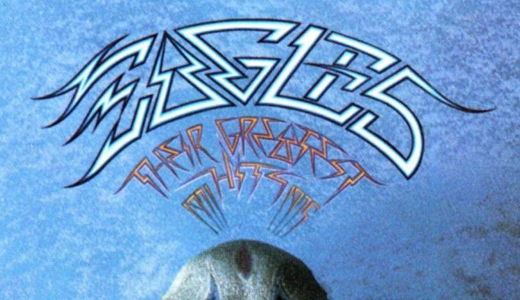For pretty much my entire adult life, it’s been common knowledge that Michael Jackson’s seminal 1982 album Thriller was the best-selling record (remember those?) of all time.
Well, now it’s not.
According to new sales and streaming tallies by the Recording Industry Association of America, Thriller’s been dethroned by the Eagles. That band’s 1976 album, Their Greatest Hits 1971-1975, is (at least for now) the biggest-selling album of all time.
The RIAA hadn’t updated its numbers for that Eagles’ LP since 2006, when it was at the 28X platinum mark—or 28 million copies sold. Since then, the organization has begun tallying streams as well as physical sales. And as of 2018, Their Greatest Hits 1971-1975 now stands at 38 million “sales” (with 1,500 individual track streams, as well as 10 paid song downloads, each counting as an album-equivalent sale.)
Admittedly, paying attention to album-sale tallies of albums that came out more than four decades ago is a bit, as the saying goes, “inside baseball.” Music nerds like me are likely the only ones really paying much attention to stories like this.
But I think there are a couple of takeaways worth our consideration.
First, the Eagles and Jackson’s Thriller both belonged to an era that embraced, as some have called it, the “monoculture,” which is now well in our rearview mirror. We might not have liked everything that had caught the culture’s collective eye, but we knew of it, at least. In 1976, I’d argue that most people had heard and could probably sing the Eagles smash hit “Take It Easy.” In contrast, Billboard’s critics recently chose Cardi B’s single “I Like It” as the best song of 2018 thus far. (Drake leads with “God’s Plan” when it comes to raw sales.) Have you heard it? Have you heard of it? Have you heard of Cardi B? I’m not trying to be a “hater” here (and my mid-40s bias is probably leaking out a bit too, so I’ll own that), but I have my doubts about whether this Cardi B song is going to be driving album sales for her four decades from now.
The music world today is as fragmented and segmented as the one in 1976 or 1982 was universal. We’re unlikely to ever see or hear anything like the Eagles or Michael Jackson’s utter dominance again.
But here’s another interesting turn in this story: Even as our music world fragments further, there’s still a measurable hunger for all that stuff from the old “monoculture” days. Take iTunes’ album chart, for instance. More than 20 of those 100 albums are what’s known as “catalog” albums, i.e., albums released many years ago. Artists enjoying relatively huge ongoing download sales include ABBA, Queen, Smashing Pumpkins, Pearl Jam, Journey, Pink Floyd, the Eagles (of course), The Smiths, Depeche Mode, Tom Petty and the Heartbreakers, Fleetwood Mac, No Doubt, ELO, the Beach Boys, Guns N’ Roses, Metallica, Def Leppard and Bob Seger.
And that’s not even counting compilation albums such as the four charting Mamma Mia! and Guardians of the Galaxy soundtracks. They, too, evince a continued hunger for a lot of stuff that, by pretty much any measure, is now “old.”
Now here’s the final “so what?” turn I want to make in this blog today. Obviously, there’s a sentimental nostalgia for the music of yesteryear. I confess, it’s a nostalgia that I share. Many of the bands above produced music that I unabashedly love, music that formed the soundtrack to my own youth. Songs like, let’s say, “Don’t Stop Believin'” from Journey. Nothing wrong, I don’t think, to enjoying the smile that track still puts on my face.
But as we’re smiling along to the songs of our youth—and maybe repurchasing, downloading or streaming them—let’s not let nostalgia cloud our vision regarding many of these tunes’ subject matter. Some of them had pretty big content issues back in the day, and they still do decades later—even if those issues may seem almost “quaint” in comparison to the racier stuff dominating the charts today.
So when it comes to these so-called “heritage acts,” we still need to exercise discernment—even for songs that might seem to give us that “Peaceful Easy Feeling” that the Eagles chronicled all the way back in 1972.






Recent Comments